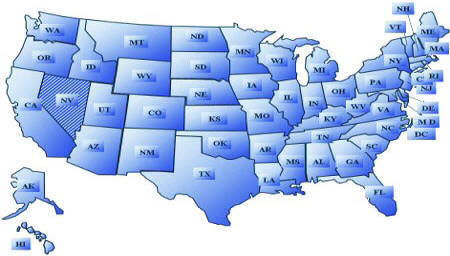 |
Insurance Zip Code Search Clerk's Office
District Clerk
District clerks are called on to assure that the affairs of the district courts
are maintained objectively with the full confidence of judicial authorities.
The US COUNTY Government Code states the duties and powers of the clerk of
the district court: "The clerk of the District Court has custody of and shall
carefully maintain and arrange the records relating to or lawfully deposited in
the clerk's office." The district clerk shall:
- Record the acts and proceedings of the district court;
- Enter all judgments of the court under the direction of the judge;
- Record all executions issued and the returns issued on the executions;
- Process passport applications;
- Administer child support payments;
- Administer trust accounts for minors ordered by the courts;
- Keep an index of the parties to all suits filed in the court, and make
reference to any judgment made in the case; and
- Keep an account of all funds collected by the office, by way of fines and
fees, and the amount due jurors in district court for service.
County Clerk
Without county clerks, many of government's underlying responsibilities would go
undone.
The main duties of the county clerk are:
- Administering all county and state elections, including early voting and
primaries, unless the commissioners court has transferred the function to the
tax assessor-collector or an office of county election administrator;
- Serving as clerk of the county court and the commissioners court and keep
records of the proceedings;
- Acting as recorder of deeds and other instruments;
- Filing and recording birth and death certificates;
- Recording assumed names, wills and probate;
- Issuing marriage licenses; and
- Accounting for all funds paid to the office by way of fines and fees, and
the amount owed to county court jurors for service.
|
|
|
|
|
Authority of State and Local Government
The Constitution of the United States establishes the relationship
between the state governments and Congress. It specifically grants certain
powers to Congress, such as declaring war and raising armies, and it prohibits
the states from activities that could undermine the national government, such as
making treaties, coining money, imposing tariffs, or making war. The
Constitution then gives the states power over everything else. In situations
where both the states and Congress claim jurisdiction, the federal courts decide
which claim is more valid. Although the national government and the states are
supposedly balanced and equal, in the 20th century the courts have tended to
favor policies that give more power to the national government at the expense of
the states.
Local governments began to gain importance in the early 19th
century. At that time, many state governments were new and relatively weak. In
addition, poor roads, primitive means of transportation and communication, and
lack of funds made it difficult for the states to adequately take care of
growing rural populations. County governments thus became an important source of
information, administration, and community unity. In many rural towns, the
county courthouse was-and often still is-the most prominent public building.
There are two types of local governments in the United States
today. Some are territorial, with jurisdiction extending over a certain
geographic area. Some county governments and local school districts are examples
of such territorial units. The second type are corporate governments, which are
based on charters granted to cities, towns, or villages by the state government.
City charters are like constitutions, although their jurisdiction is on a local
level. The state authorizes and approves these charters, which must conform to
state law.
|
|
|
|
Insurance Zip Search
|
Insurance Zip Search
|
Insurance Zip Search
|
Insurance Zip Search
|
| |
|
|
|
| |
|
|
|
|
State and Local Courts
Despite their high visibility, the federal courts deal with only
one percent of the nation's judicial business. The state and local courts-the
latter usually at the county, municipal, and township level-hear most of the
judicial cases. Annually over 25 million cases enter state and local systems;
every year, one in nine Americans is directly involved in some sort of
litigation or court proceeding.
At the state level, courts are assigned what are called police
powers over the health, morals, and safety of their citizens. Thus, by the
authority of its health power, a state legislature may require all
schoolchildren to be vaccinated; any challenge to this law would be considered
in state court. To protect community health in the late 19th century, state
courts approved a controversial quarantine of immigrants before they entered the
United States. The states' authority in these matters can be found in the Tenth
Amendment to the Constitution, which reserves powers not delegated to the
federal government to the states. At the same time, many state constitutions
include their own Bill of Rights, which limits the power of states over the
people.
By constitution or by statute, state governments create the local
courts that have jurisdiction over minor state offenses and the violation of
local ordinances, such as those involving zoning or disturbing the peace. Some
local courts have specialized jurisdiction over juveniles and domestic
relations.
|
|
|
|
|
